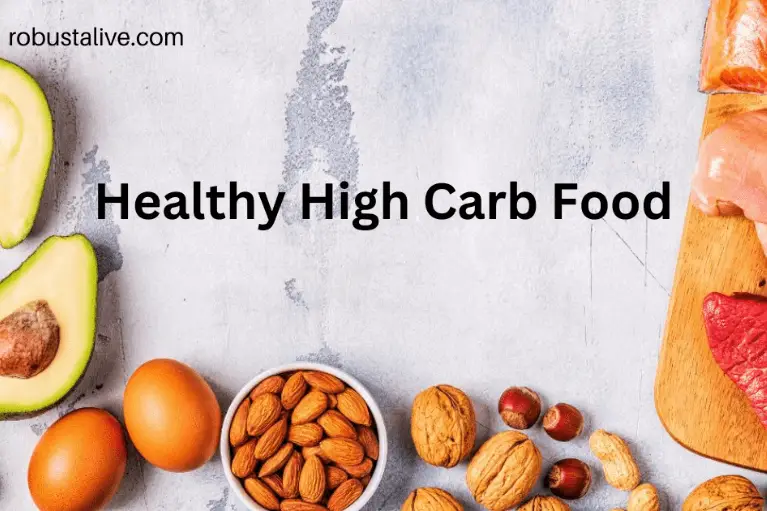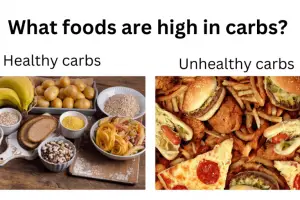What Foods are High in Carbs? Carbohydrates

While eating carbohydrates or other macronutrients, the most vital thing that matter is the quality. Choosing what foods are high in carbs is essential, as some are healthier choices while others are not. The carbohydrate amount in the diet is far less significant than the type of carbohydrate.
Eating healthy carbs is essential for your health, whereas unhealthy carbs do the opposite. For example, healthy wheat grains like barley, wheat bread, rye, and quinoa are better choices than French fries and white bread.
People often get confused about their carbohydrate intake but remember that it’s more beneficial to have carbs from healthy foods than following a strict diet that limits the count of your daily carbs.
What are Carbohydrates?
Carbs or carbohydrates are sugar molecules. With fats and proteins, carbohydrates are among the three main macronutrients commonly found in our drinks and foods. Your body breakdown the carbohydrates into glucose.
Glucose, generally known as blood sugar, is the primary energy source for our organs, tissues, and cells. It is an immediate energy source and can also be stored in the body for later use.
Types of Carbohydrates
There are three different types of carbohydrates:
-
Sugar
This carbohydrate type is generally known as carbohydrate and its simplest form. It can be added to food like desserts, candies, regular soda, and processed food. This carbohydrate type also includes the naturally found sugar in milk, vegetables, and fruits.
-
Starches
These are the complex carbohydrates that contain a lot of simple sugar that are looped together. Our body breakdown down the starches into sugars for energy usage. Examples of starches are pasta, bread, and cereal. They also have specific vegetables like peas, potatoes, and corn.
-
Fiber
It’s also a complex carbohydrate type. Our body usually doesn’t break down most of this, so eating fiber-rich food makes you feel complete for extended periods. It also lowers the chances of overeating. This macronutrient is beneficial in avoiding intestinal and stomach issues like constipation.
Fiber aids in lowering blood glucose and cholesterol level. Many plants like vegetables, fruits, seeds, nuts, whole grains, and beans contain fiber.
What Foods are High in Carbs – Healthy

Carbohydrates don’t have an excellent reputation over the years. People relate them to high cholesterol levels, type 2 diabetes, weight gain, and many other issues. I agree that processed food lacks essential nutrients and is rich in refined grains and sugar.
However, fiber-rich and nutrient-dense foods are very good for health. In comparison, there are good carbs that are very good for overall health. Instead of avoiding carbs altogether, go for the one that is good for your health.
Here are the six high-carb foods that are very health:
-
Oats
Oats are among the healthiest whole grain, rich in minerals, vitamins, and antioxidants. Raw oats have around 70% of carbohydrates. And a cup serving of about 81 grams contains 54 grams of carbs and 8 grams of fiber. They are generally high in fiber, known as oat beta-glucan.
Oats are a great source of protein and have more protein than most other grains. According to the research eating more oats reduces cholesterol levels and ultimately benefits heart health. Eating oats also help blood sugar levels, especially in type 2 diabetes patients.
Besides, the presence of fiber makes it more filling, which benefits weight management.
-
Bananas
Bananas are a trendy fruit, and people love enjoying it with different delicious recipes. A large banana of 136g has around 31g of carbohydrates, either in starch form or sugar form. They are rich in vitamins B6 and C and potassium and have many beneficial plant compounds.
Bananas aid in lowering blood pressure and improving heart health due to their high potassium content. Unripe bananas that are green in color are rich in starch. When the bananas start ripening, it turns into natural sugar and becomes yellow.
Eating a banana when it is not entirely ripe means more starch and less sugar. The less ripe and the unripe bananas also have decent pectin and resistant starch that will support the digestive system and benefits the guts’ beneficial bacteria.
-
Beets
Beets, commonly known as beetroots, are a purple color root vegetable. Though they are super high in carbs compared to the other non-starchy vegetable, they have a high amount. Cooked and raw beets have around 10g of carbs per100g. It’s mainly from fiber and sugar.
They are also full of minerals, vitamins, and other potent plant compounds and oxidants. Beets also have a high ratio of the inorganic nitrates that our body converts into nitric oxide. Nitric oxide benefits the body by lowering the risk of many diseases and controlling blood pressure.
Due to the presence of a high amount of nitrates in the beet juices, athletes prefer it to improve their physical performance. Nitric oxide relaxes the blood vessels that allow the efficient flow of oxygen during exercise.
-
Grapefruit
Grapefruit is a citrus fruit with a bitter, sour, and sweet flavor. It has around 8% carbs and is rich in minerals, vitamins, and antioxidants. According to studies on humans and animals, it was concluded that grapefruit improves blood sugar and heart health.
Furthermore, some other research suggests that there are specific compounds in grapefruits that can aid in the prevention of kidney stones, maintain cholesterol levels, and even slow down the spread and growth of cancerous cells. However, more studies are needed for the conformation of human grapefruit benefits.
-
Kidney Beans
Kidney beans are the legume family members and a common bean. The 100 grams of cooked kidney beans have about 21.5g of carbs in fiber and starch. Legumes are also rich in protein.
They are an excellent source of minerals, vitamins, and plant compounds. It’s also rich in antioxidant compounds like isoflavones and anthocyanins. There are many other health benefits, like improving blood glucose levels and reducing the risk of colon cancer.
-
Quinoa
Quinoa is a nutritious seed that is becoming incredibly popular among health-conscious people. It is classified as a pseudocereal and a source prepared to eat like a grain. Cooked quinoa has about 70% of carbs, which makes it a high-carb food. It is also rich in fiber and protein.
Quinoa has a high number of plant compounds and minerals linked with various health benefits like improvement in heart health and blood sugar levels. In addition, it doesn’t have any gluten, making it popular among people on a gluten-free diet. Quinoa has a high protein and fiber content that makes it fulfilling. That is why; it can also promote gut health and weight management.
Why You Should Reduce Carbs
For active people, carbs can prove to be an excellent energy source. But if you are not that active, you should limit the carbohydrate intake to maintain an ideal weight. Experts recommend 130 grams of daily carbs for the average adult or between 50% to 65% of your daily calories.
High carbs are associated with an increased risk of obesity, chronic diseases, and decreased physical activity. However, carbohydrate quality has a more significant role in overall health than carbohydrate quantity.
Carbs intake from potatoes, sugars, and processed grains increases the risk of cardiovascular diseases, diabetes, cancers, obesity, and type 2 diabetes. However, non-starchy vegetables like legumes, whole grains, and fruits are healthy for overall health.
The carbohydrate intake from processed food, potatoes, and processed legumes increases the risk of the following diseases:
-
Metabolic Diseases
Research shows that a diet with excessive carbs can have a high risk of metabolic diseases. Metabolic syndrome or disease is a group of risks that can contribute to diabetes and other heart diseases. The risk factors of metabolic syndrome include the risk factors like high blood sugar, high blood pressure, low HDL cholesterol, belly fat, and high triglycerides level.
-
Obesity
Research shows that a high-carb, starchy diet can result in a decrease in physical activity that can lead to weight gain. Weight gain more than usual can result in obesity.
-
Diabetes
Food with high carbohydrate content increases weight rapidly. Excessive weight gain can increase diabetes chances and make you prone to many other diseases.
-
Cardiovascular Disease
Diets rich in carbs, especially high-sugar foods and high starch, can increase the cardiovascular disease risk in some people.
Low Carb Foods
Low carbs foods are beneficial if you are on a low-carb diet or want to maintain your weight and blood glucose levels. Some low-carb foods are healthy and filled with healthy fats, proteins, or other nutrients. Some of these have unhealthy fats. The following low-carb foods can help you keep track of your carbs and choose what is healthier for your body.
-
Nuts, Seeds, and Peanuts
Peanuts, pumpkin and sunflower seeds, hazelnuts, pecans, and other nuts are low in carbs and rich in healthy fats. They can provide you with fiber and protein.
-
Meat, Seafood, and Poultry
Meat, fish, and poultry are free of carbohydrates. Some shellfish do have a minimal amount. Processed meats like ham can have a bit of starch and sugar. However, fats don’t have carbs but still trim them from the skin and meat of your poultry to lower the intake of unhealthy and saturated fats. Fish is a very healthy choice as it benefits heart health.
-
Fats
While the pure form of fats is carbohydrate-free, some are still healthier than others. Limit your lard, hydrogenated oils, margarine, and butter content. Go for plant-based oils and olive oil whenever it’s possible or you have the chance to do so.
-
Cheese
Milk is a natural source of yogurt and carbs and has about 10, 20, or maybe 30 grams of carbs. But cheese is generally low in carbs. Cheddar, Mozzarella, feta, Swiss, blue cheese, and parmesan are low-carb cheeses. In addition, cottage cheese is also a low-carb cheese though it is a little higher than the mentioned above.
-
Non-starchy Vegetables
Low-starchy vegetables are the ideal choice for a low-carb diet. They have fewer calories and carbohydrates but are primarily rich in fiber, vitamins, and minerals. Green leafy vegetables like lettuces, spinach sprouts, cucumbers, celery, mushrooms, eggplants, cauliflowers, bell peppers, and sprouts are just a few the possibilities.
Add Healthy Carbohydrates to Your Diet
Here are a few healthy tips that will benefit you in adding healthy carbohydrates to your diet;
Start your day with whole grains.
A cereal like the steel cut oats (old fashioned ones, not the instants), or a cold cereal that includes whole grains with low sugar as first in the ingredient list. Choose a cereal with at least 4 grams of fiber and less than 8 grams of sugar in one serving.
Use whole-grain bread for lunch and snacks.
Wondering how to find whole-grain bread? Then look at the ingredients with the whole rye, wheat, or other whole grain mentioned. It would be even more beneficial if the bread were made of 100% whole wheat.
Look beyond the bread aisle.
Whole wheat bread is generally high in sodium as they are made up of finely ground bread and flour products. Instead of bread, try eating a whole-grain in a salad such as brown rice and quinoa.
Choose whole fruit instead of juice.
An orange double-doubled the fiber and half the sugar as in a 12-ounce orange glass juice.
Skip on potatoes and go for the beans
Rather than filling up on potatoes, which promotes weight gain, choose beans, an excellent source of slowly digested carbohydrates. Beans and other legumes like chickpeas provide a healthy protein dose.
Conclusion
It’s an absolute myth that all carbs are unhealthy. Several healthy fruits are rich in carbs. You should eat fewer carbs when instructed to follow a low-carb diet. Contrarily refined carbs like pasta and white bread can be unhealthy if you take them in large amounts.
But you can enjoy healthy and delicious carbs as a part of your whole foods diet.
FAQ’s
-
What foods are high in carbs and are unhealthy?
Here are some of the high-carb foods that are poor nutritious carbohydrate sources;
- Doughnuts
- Processed cereals
- Soft pretzel
- Canned fruits
- Gummy candy
- Soda
- French fries
- Corn chips or potatoes
-
Is rice a good source of carbohydrates?
Rich is rich in carbohydrates and is the body’s primary fuel. Carbohydrate keeps you satisfied and energized and is vital for fueling exercises. Brown rice is an excellent fiber, magnesium, vitamin B, and selenium source.
-
Are eggs rich in carbs?
Eggs are a very healthy and rich source of protein. Every large egg has less than 1 gram of carbs and about 6 grams of proteins. Due to this, it’s an ideal fit for the keto diet.
-
How to avoid carbs in daily life?
There are many different ways to reduce carbohydrates intake:
- Try the alternatives for sugars
- Avoid restaurant meals
- Substitute the alternative flavors
- Have a low-carb breakfast
- Eat less refined bread
- Avoid the fruit juices
- Avoid sugar-sweetened drinks
-
How many carbs should I eat in a day?
According to the recommended dietary guidelines for Americans, your daily carbohydrate intake should make up 45% to 65% of your daily calories. So if you are eating 45% to 65% of your total daily calories, you can get 2000 calories daily. Among these 2000, the 900 to 1300 calories should be from your carbs. That means around 225 to 325 grams of carbs in a day.
References:
- https://www.hsph.harvard.edu/nutritionsource/carbohydrates/#:~:text=Carbohydrates%20are%20found%20in%20a,sugars%2C%20fibers%2C%20and%20starches.
- https://www.healthline.com/nutrition/15-ways-to-eat-less-carbs
- https://www.mayoclinic.org/healthy-lifestyle/nutrition-and-healthy-eating/in-depth/carbohydrates/art-20045705
- https://www.healthline.com/nutrition/14-foods-to-avoid-on-low-carb
- https://www.webmd.com/diet/foods-high-in-carbs
- https://www.healthline.com/nutrition/12-healthy-high-carb-foods
- https://www.medicalnewstoday.com/articles/323110
- https://medlineplus.gov/carbohydrates.html





